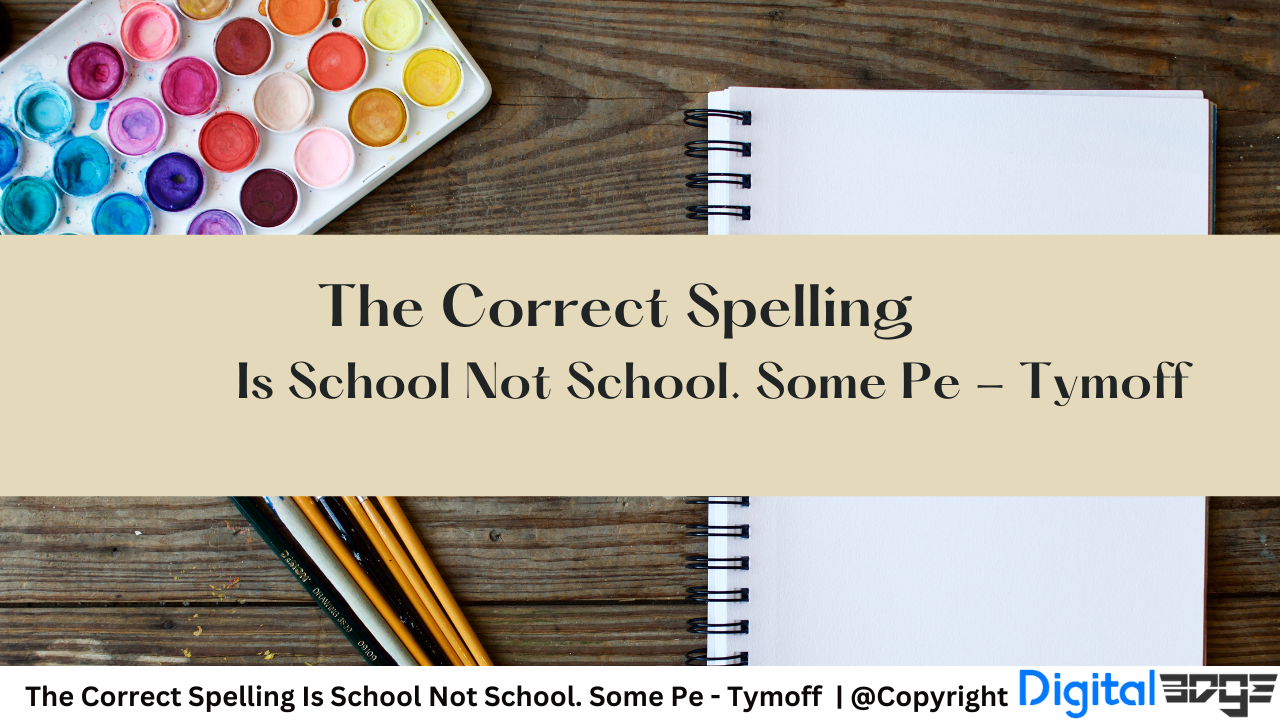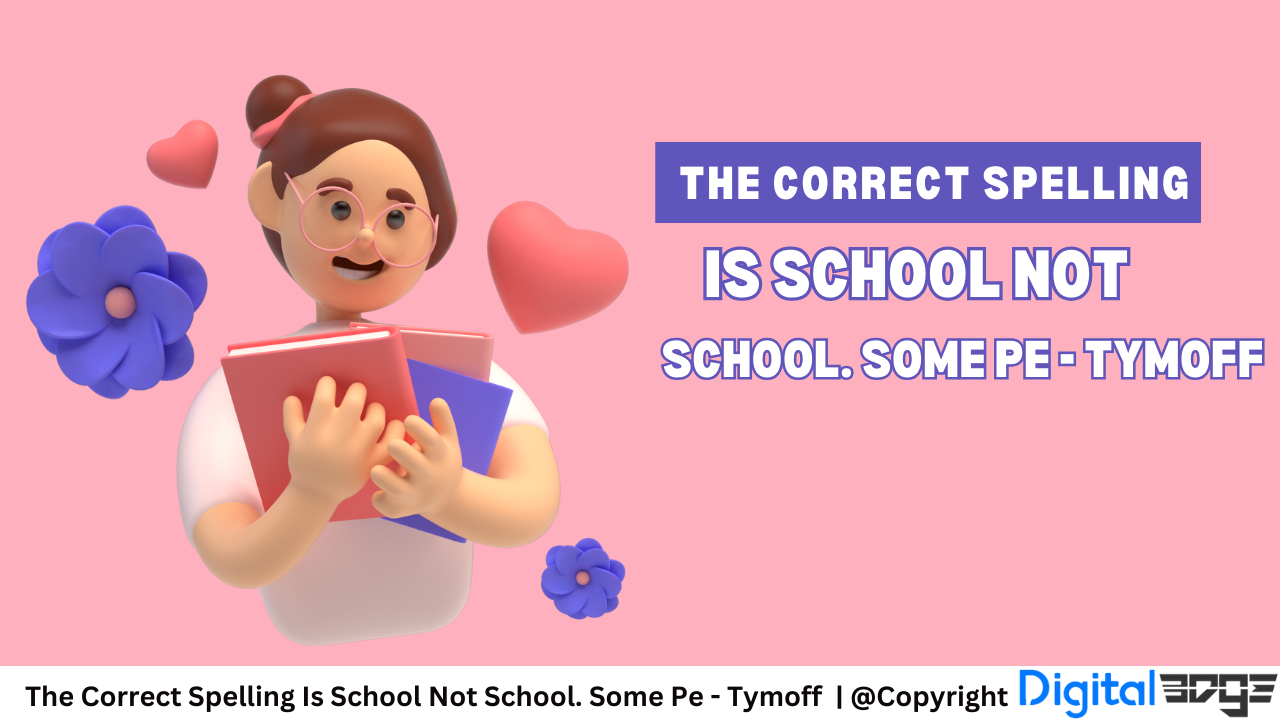Language can be puzzling. Consider the phrase “the correct spelling is school not school. some pe – tymoff.” It illustrates the challenge of getting spelling right, like “school” instead of “schoool.” Even small spelling differences can completely change a sentence’s meaning.
For instance, “school” and “schoool” look similar but mean different things. Being careful with details is crucial for clear communication.
English spelling is confusing, but it’s also an opportunity to learn and improve. Embrace these challenges to broaden your understanding.
Enjoy mastering this intricate language. Keep practicing and have fun exploring the depths of language! In the ever-changing world of language, “school not school” is a playful reminder of its complexities and quirks.
The Importance of “School”
Using the correct spelling of “school” with a “c” is crucial. It demonstrates our commitment to learning and improvement while showing respect for educational institutions. Proper spelling enhances communication clarity in a world often filled with ambiguous information.
School embodies teamwork and community in education. It signifies our collaborative efforts in sharing knowledge and understanding.
By using the accurate spelling, we underscore our belief in the value of education and our desire for universal learning opportunities.
When we spell words correctly, it helps others understand our messages clearly. This is especially important when sharing information in today’s world, where there is a lot of information but not always clear understanding.
Correct spelling also shows that we care about the details and take pride in our communication skills.
Additionally, using the correct spelling of “school” acknowledges the significance of these places in our lives.
Schools are not just buildings; they are centers of learning and growth. They play a vital role in shaping individuals and societies by fostering knowledge, skills, and values.
School Symbolizes Enlightenment
The proper spelling is “school,” not “school.” When we examine language closely, we uncover hidden meanings. The correct spelling of “school” demonstrates our respect for language and the importance we place on education.
It reminds us that even small details carry significant meanings. In our busy lives, we may overlook spelling rules. However, by correctly spelling “school,” we show our commitment to precision and excellence in communication.
Each letter in its place reflects our dedication to clear and professional writing.
Frequent Misspellings of “School”
The correct spelling is “school,” not “school.” Many people make this mistake because of autocorrect on devices. Autocorrect can change the right word to a similar one without people noticing.
Technology can help or hurt our language skills. It can cause unintentional mistakes. Misspelled words are common in fast online messages like texts and social media.
Quick writing often leads to careless spelling. Taking time to check and fix our writing can help us avoid common mistakes like spelling “school” as “school.”
Community Impact and Unity
The correct spelling is “school,” not “school.” Some argue it’s more than just a mistake. It shows how much education matters to us.
Each correctly spelled word has a meaning. It represents a place where people grow and develop.Using the right spelling helps us see how schools shape individuals and societies.
This also makes us think about how schools affect social mobility and community building.
Using the correct spelling shows how schools give opportunities for everyone to succeed.
It reminds us that education is about learning and creating inclusivity and empowerment in our communities.
By pointing out this small but important spelling difference, we celebrate how schools bring progress and change to society.
The Value of Correct Spelling
Correct spelling is crucial for formal communication. Errors in spelling can alter your intended message. Such mistakes can impact how others perceive your professionalism.
Paying careful attention to spelling is highly significant. It demonstrates respect for your reader and the language itself. Consistent spelling helps establish trust. Using words accurately enhances the clarity and strength of your message.
When we spell words correctly, we ensure that our ideas are conveyed clearly and effectively. This clarity is especially important in professional settings where precision in communication is valued.
A correctly spelled document or message reflects attention to detail and a commitment to clear, understandable communication.
It shows that you have taken the time to review and refine your writing, which can leave a positive impression on your audience.
Moreover, accurate spelling contributes to the overall professionalism of your work. Whether you are writing a report, composing an email, or preparing a presentation, using correct spelling reinforces your credibility and expertise.
It helps to maintain a professional image and fosters confidence in your abilities.
School, Not Schoool: Understanding the Difference
The right spelling is “school,” not “schoool.” This phrase makes us think about language and perception. It challenges us to look deeper and find hidden meanings in simple words.
It reminds us that familiar things can be complex when seen differently. “Pe – tymoff” might disrupt our understanding, like unexpected obstacles in life. It makes us pause and think beyond our assumptions.
This phrase tells us to question, explore, and broaden our views on language and communication. It encourages us to embrace ambiguity and new ideas.
Put It in Your Own Words
Remember to spell “school” correctly, not “school”. It’s a fun way to show how even simple words can be tricky.
Enjoy playing with language quirks. When writing “school”, remember that extra “o” at the end – it’s part of the fun!
In a world with autocorrect, taking a moment to think about spelling can be satisfying.


